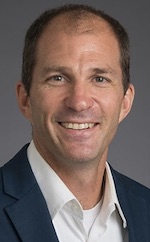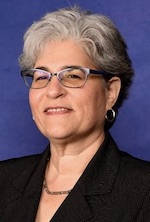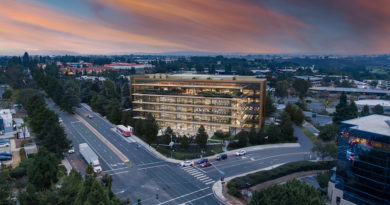Daily Business Report: Friday, Dec. 16, 2022
Election research fuels growing
movement to boost voter turnout
By Steve Schmidt
Election research pioneered by UC San Diego political scientist Zoltan Hajnal is not only having a real-world impact in California, but is starting to take root beyond the state.
In the 2022 midterm election, voters in the Seattle region and Boulder, Colo., approved measures requiring that municipal elections be held on the same day as state or national races – a move that, according to Hajnal’s research, is expected to significantly boost turnout and broaden the electorate.
Voters in San Francisco also approved a similar measure in November, bringing the city in step with a 2015 California law designed to align the timing of local elections with state and federal contests.
Meanwhile, voter turnout in L.A.’s mayoral contest was unusually high – and the city’s first-ever synced election was seen as a major driving factor.
Hajnal, co-director of the Yankelovich Center for Social Science Research in UC San Diego’s School of Social Sciences, was instrumental in the development of the 2015 state law, or Senate Bill 415 (the California Voter Participation Rights Act). He has since testified before elected officials on the issue of synced local and national contests and has talked about his research with voting rights groups and others nationwide.
“Studies indicate that this small change in timing makes a major difference in turnout, “ said Hajnal. “Nationwide, the data indicate that even when all factors are weighed, voter turnout generally doubles when elections move from off-cycle to on-cycle contests. Plus, more voters means a more representative electorate – and that helps strengthen our democracy.”
Top Illustration by iStock_SiberianArt (Courtesy UC San Diego). Below, Zoltan Hajnal, co-director of the Yankelovich Center for Social Scienc Research.
Discovery could explain why women
are more likely to get Alzheimer’s
Scientists at Scripps Research and Massachusetts Institute of Technology (MIT) have found a clue to the molecular cause of Alzheimer’s—a clue that may also explain why women are at greater risk for the disease.
In the study, reported on December 14, 2022, in Science Advances, the researchers found that a particularly harmful, chemically modified form of an inflammatory immune protein called complement C3 was present at much higher levels in the brains of women who had died with the disease, compared to men who had died with the disease. They also showed that estrogen—which drops in production during menopause—normally protects against the creation of this form of complement C3.
“Our new findings suggest that chemical modification of a component of the complement system helps drive Alzheimer’s, and may explain, at least in part, why the disease predominantly affects women,” says study senior author Stuart Lipton, M.D., professor and Step Family Foundation Endowed Chair in the Department of Molecular Medicine at Scripps Research and a clinical neurologist in La Jolla.
California doubling the number of EV
chargers with $3 billion investment
The California Energy Commission has approved a plan for nearly $3 billion in funding for 90,000 new electric vehicle chargers in the state, accelerating the state’s transition to clean transportation. That’s a 30x increase in funding from 2019 levels.
The funding will double the state’s charging network from 80,000 publicly available chargers to 170,000, keeping the state on track to achieve its goal of 250,000 chargers installed by 2025.
The funds support the deployment of thousands of zero-emission trucks, school buses and transit buses to deliver clean air benefits and good paying jobs to neighborhoods across the state, and especially to communities hit hardest by the impacts of pollution from trucks and buses. At least half of the funding will benefit low-income and historically disadvantaged communities on the front lines of the climate crisis.
Michelle Fischthal named a vice chancellor
for the San Diego Community College District
Michelle Fischthal, a vice president at the San Diego College of Continuing Education, has been selected by the San Diego Community College District for a newly created position of vice chancellor, institutional innovation and effectiveness.
She will begin her new assignment Feb. 1, 2023.
In her new role, Fischthal will be responsible for leading several key areas for the district, including accreditation, districtwide institutional research, strategic planning, institutional effectiveness, and educational technology and services.
Her job also will include developing and planning data and research studies and reports for the district’s board of trustees. Most importantly, her role will include driving innovation across the district, which is one of California’s largest community college districts.
Fischthal has served in leadership roles at the College of Continuing Education since 2012.
She has been serving as vice president, instructional services there since February 2018.
County supervisors approve program
to promote native plants
County supervisors have approved the creation a program to promote the use of native plants. The program would aim to preserve the county’s natural environmental character and unique plant life, reduce water use, stormwater pollution and protect animals from the effects of climate change.
The multi-year program will begin with creating a website where people can learn more about native plants, developing educational materials for the public and professional landscapers, and installing demonstration gardens at county buildings. The program would ultimately create incentives to encourage people to use native plants, offer ready-made landscaping templates to incorporate their use, and create a native plant landscaping design manual.
“These native plants are really what makes San Diego County our county,” said Board Chair Nathan Fletcher.
Scientists develop compound that
reverses gut inflammation in mice
A drug developed by Salk Institute researchers acts like a master reset switch in the intestines. The compound, called FexD, has previously been found to lower cholesterol, burn fat, and ward off colorectal cancer in mice. Now, the team reports in Proceedings of the National Academy of Sciences on December 12, 2022, that FexD can also prevent and reverse intestinal inflammation in mouse models of inflammatory bowel disease.
San Diego Angel Conference announces
its fifth conference series
San Diego Angel Conference, a University of San Diego Knauss School of Business and Brink SBDC program that activates accredited angel investors and engages promising early-stage companies, has launched its fifth angel conference series. SDAC provides mentorship, education, resources, and valuable connections to early-stage companies seeking angel funding, as it engages first-time and experienced angel investors interested in building their investment portfolios. The application deadline for entrepreneurs is Jan. 19. SDAC is accepting applications from the U.S., Canada, and Mexico at www.thesdangels.com/apply.
GoFormz earns 26 G2 awards
San Diego-based GoFormz, a leading digital forms and data collection platform, announced that it has earned the highest awards in the mobile forms automation category on G2, the world’s leading peer-to-peer software review site. GoFormz is recognized as the #1 mobile forms automation software for the third straight quarter and continues to earn the highest customer satisfaction score. GoFormz’s G2 awards also include Enterprise Leader, Customer Satisfaction Leader, and Online Form Builder Leader.
U.S. Navy awards Metron $7.8 million contract
for algorithm and simulation research
Metron Inc., a leading provider of advanced research, scientific and software solutions for defense, federal, and private-sector industries, has been awarded a $7,806,349 Office of Naval Research contract for “Advanced Algorithm Development for Autonomous Marine Systems.” The contract award will leverage Metron’s expertise in mission and path planning, object detection, tracking and data fusion, autonomous behaviors, and Unmanned Underwater Vehicle (UUV) simulation. The company has offices in San Diego, Portland, Ore., Honolulu, Hawaii and Denver, Colo.
Kintara Therapeutics receives
FDA Orphan Drug Designation
Kintara Therapeutics Inc., a San Dieogo biopharmaceutical company focused on the development of new solid tumor cancer therapies, has received Orphan Drug Designation (ODD) from the U.S. Food and Drug Administration for VAL-083 for the treatment of diffuse intrinsic pontine glioma, a rare and highly-aggressive childhood brain cancer. The FDA’s ODD program provides orphan status to drugs defined as those intended for the treatment, diagnosis or prevention of rare diseases that affect fewer than 200,000 people.
Avidity Biosciences proposes public stock offering
Avidity Biosciences Inc., a San Diego, biopharmaceutical company committed to delivering a new class of RNA therapeutics called Antibody Oligonucleotide Conjugates (AOCs), announced that it intends to offer and sell $150 million of shares of its common stock in an underwritten public offering. In addition, Avidity intends to grant the underwriters a 30-day option to purchase up to an additional 15 percent of the shares of common stock offered in the public offering. All of the shares to be sold in the offering are to be sold by Avidity.
Gregory Whyte appointed executive vice
president of Realty Income Corporation
Realty Income Corporation announced the appointment of Gregory J. Whyte as executive vice president, chief operating officer. The appointment will take effect Jan. 3, 2023. Whyte was senior adviser in the Real Estate Leisure and Lodging Investment Banking group at UBS Securities from 2007 to 2016. Prior to that, he was managing director, global head of real estate equity Research at Morgan Stanley from 1991 to 2006. Since 2022, Whyte has served as an independent director of Orion Office REIT Inc., including as the chair of its Compensation Committee.
Solve Therapeutics announces its mission
to develop antibody-based therapies against cancer
Solve Therapeutics Inc., an oncology-focused biopharmaceutical company, announced its mission to develop novel antibody-based therapies targeting tumor-specific antigens. The company’s formation reunites the former VelosBio Inc. team, a highly experienced group with a proven ability to rapidly advance innovative therapeutics that address unmet medical needs in the treatment of cancer. SolveTx is supported by a board of directors and a top-tier investor syndicate. The company is fully operational with 25+ employees and is actively pursuing discovery and development efforts at its 10,000-square-foot, state-of-the-art laboratory in San Diego.
Airgain Inc. announces partnership with Errigal
San Diego-based Airgain Inc., a leading provider of wireless connectivity solutions, creating and delivering products that include embedded components, external antennas, and integrated systems across the globe – announced its partnership with Errigal, an enterprise software company specializing in network operation automation and management. The companies are teaming up to develop simplified end-to-end solutions that provide Airgain customers with wireless network monitoring management tools for their network infrastructure and client devices.
Immervision partners with San Diego’s ModalAI
Immervision, a leading developer of advanced vision systems combining optics, image processing, and sensor fusion technology, announced its partnership with San Diego-based ModalAI Inc., a Blue UAS Framework manufacturer of autonomous drone and robot technology. This collaboration will lead to an advanced “ready-to-fly” vision system for drone manufacturers. Both companies are part of the Defense Innovation Unit (DIU) Blue UAS Framework, which accelerates commercial technology with the aim of providing trusted, advanced capabilities to UAV drone users.







